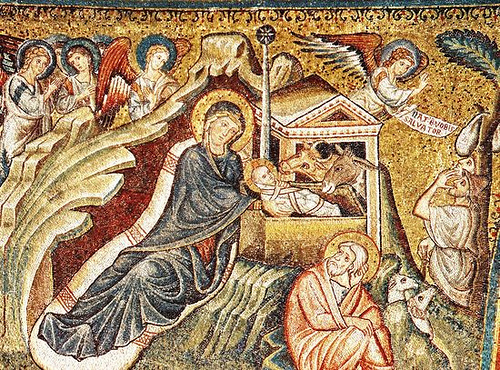We run our website the way we wished the whole internet worked: we provide high quality original content with no ads. We are funded solely by your direct support. Please consider supporting this project.

The Cross in the Manger
There has been a strand within the Western theological tradition—one that is especially prevalent in contemporary American Evangelicalism—that construes the significance of the cross in strictly soteriological terms. The cross is central, in this view, but only in the sense that the reason Jesus came to earth was to pay the price for our sin by dying, thereby allowing God the Father to vent his wrath on him in our place. This myopic focus, combined with this “penal substitutionary” understanding of the atonement, tends to relegate everything else Jesus said and did leading up to his passion to a secondary status. Hence, far from providing the thematic center of Jesus’ identity and mission, this perspective tends to divorce the cross from every other aspect of Jesus’ identity and mission.
The union of God and man in Jesus is “one dynamic event from the incarnation to ascension,” as T. F. Torrance wrote. God did not unite himself to a man and then, as a secondary thing, act. Instead, in Jesus, his personhood, his words and his acts are inseparable.
If this is true, then we can never separate who Jesus is as the God-man from what he did. We can also no more separate Jesus’ atoning work on the cross from the Incarnation and/or any other aspect of his life and ministry. Torrance writes, “we must think of [Christ’s] incarnate life and his redeeming activity as completely interwoven from his conception and birth to his crucifixion and resurrection.” And again, “Incarnation and atonement intrinsically locked into one another constitute the one continuous movement of God’s saving love for the world.”
Moltmann makes a similar point, when he asserts:
The incarnation of the Logos is completed on the cross. Jesus is born to face his passion. His mission is fulfilled once he has been abandoned on the cross. So it is impossible to speak of an incarnation of God without keeping this conclusion in view. There can be no theology of the incarnation which does not become a theology of the cross. As soon as you say “incarnation,” you say “cross.”
We cannot separate his death out from his life. The cross is the quintessential expression of who Jesus was and everything he was about. The indivisible and perfectly integrated wholeness of the one in whom God became human is oriented, from manger to ascension, around the cross. We could say the same thing by claiming that Jesus’ mission centered on sacrificially reconciling humanity to God, or by claiming that Jesus’ mission centered on revealing God’s true, self-sacrificial, loving nature to humanity. The atonement and revelation are two sides of the same coin. God reconciles humanity to himself by revealing his true loving character, and God reveals his true loving character by reconciling humanity to himself. And this revelation-that-is-reconciliation and reconciliation-that-is-revelation takes place in the Word made flesh, understood as “one dynamic event from incarnation to ascension”.
If it is the whole unity of the person and work of Jesus that reveals God to us, then this unity must be centered on the love of God that was supremely revealed on the cross. Hence, while the common, myopic, Evangelical understanding of the cross tends to isolate the cross from other aspects of Jesus’ identity and mission, this view centralizes the cross as the thread that weaves together every aspect of Jesus’ life, from the incarnation first displayed in the manger to his ascension.
Photo Credit: jimforest via Flickr
Category: General
Tags: Christmas, Cross, Incarnation, Jesus, Jürgen Moltmann, T. F. Torrance
Topics: Christology
Related Reading

Look at Jesus
http://youtu.be/AO2VBoyruIM Here’s a lovely reflection by N.T. Wright for your Sunday. When in doubt, look at Jesus. You can’t go wrong.

How the Cross Erases Your Sin
In Colossians 2:14, we read how God canceled the charge of our legal indebtedness which stood against us and condemned us. That word “canceled,” means to wipe out, to erase, or to abolish. By means of the cross, God wiped out our indebtedness to the law that stood over us that Satan used to condemn…

How Should We Respond to Bullies?
Greg answers a question from parents as to how their child should respond to a bully.

The Real St. Nicholas
Steve Rhodes via Compfight Here’s a really funny and informative blog post by Peter Enns. We don’t want to give too much away, but it involves, Santa, St. Nicholas and Samuel L. Jackson. How can you resist that?

Overemphasizing Christ?
In response to my work, some have argued that I tend to overemphasize Christ. In light of the claim that in Jesus we have the one and only definitive Word of God and that no previous revelation should ever be placed alongside him or allowed to qualify what he reveals about God, some allege that…

Guest Post: Culture War Neighbors by Bonnie Kristian
Matteo Parrini via Compfight The first time I was aware of meeting a gay person, I was 18. I took a summer job waiting tables, and it turned out two of my coworkers were attracted to people of the same sex. One, a waiter in his 40s, fit every stereotype on Will and Grace. The…
